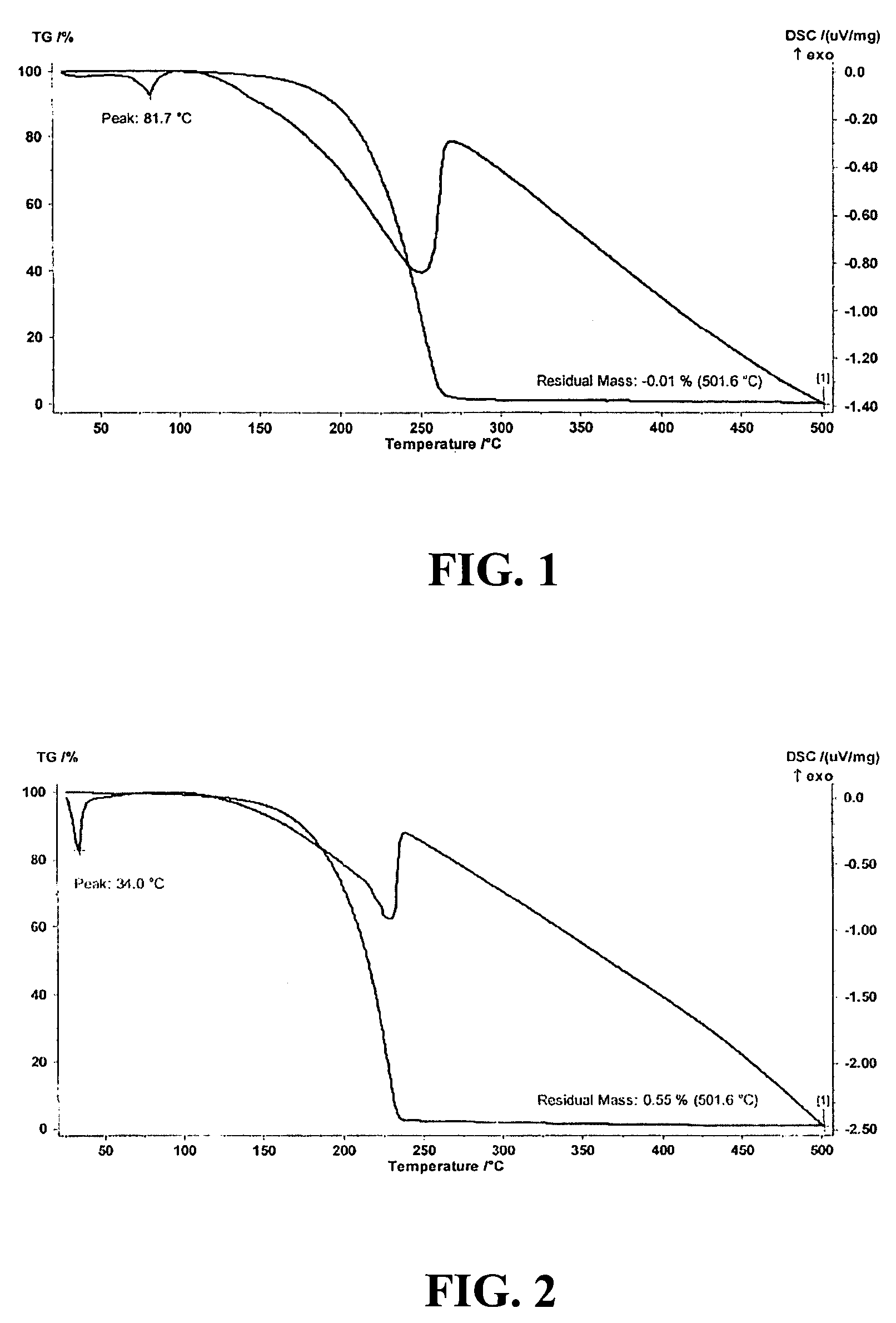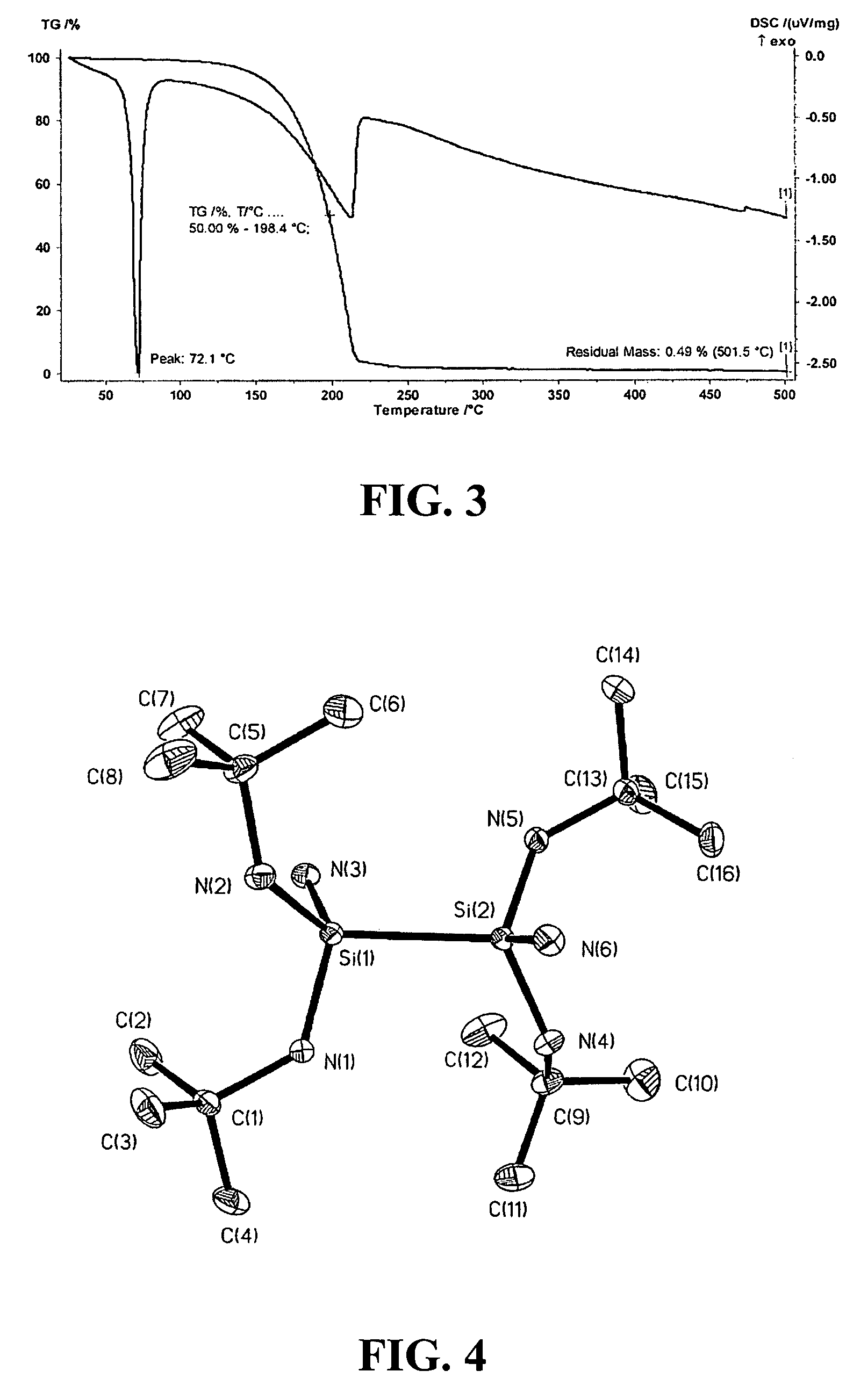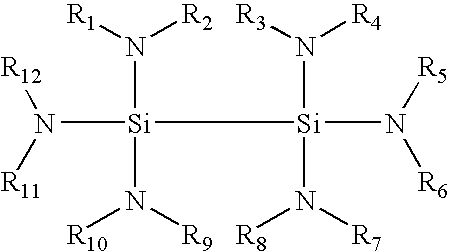Composition and method for low temperature deposition of silicon-containing films
a technology of silicon-containing films and low temperature deposition, which is applied in the direction of crystal growth process, polycrystalline material growth, chemically reactive gases, etc., can solve the problems of particle contamination and solid build-up in vacuum system, reducing the life time and long-term performance of devices, and significantly reducing the life time and long-term performan
- Summary
- Abstract
- Description
- Claims
- Application Information
AI Technical Summary
Problems solved by technology
Method used
Image
Examples
example 1
Synthesis of (NEt2)2(HNMe)Si—Si(HNMe)(NEt2)2
[0033]The disilane compound (NEt2)2(HNMe)Si—Si(HNMe)(NEt2)2 can be synthesized by reacting (NEt2)2(Cl)Si—Si(Cl)(NEt2)2 with excess amount of H2NMe, according to the following equations:
(NEt2)2(Cl)Si—Si(Cl)(NEt2)2+excess H2NMe→(NEt2)2(HNMe)Si—Si(HNMe)(NEt2)2+2H2NMe·HCl
[0034]Specifically, a 1 L flask was filled with a solution comprising 500 mL diethyl ether and 20 grams (48.2 mmol) of (NEt2)2(Cl)Si—Si(Cl)(NEt2)2. H2NMe was bubbled into such solution. White precipitate was observed during the addition of H2NMe. Approximately 20 grams of H2NMe (644.25 mmol) was added into the 1 L reaction flask during a ten-hour period. The resulting mixture was filtered, and all volatile materials were removed from the filtrate under vacuum conditions. The crude yield was about 90%. Either vacuum distillation or low temperature crystallization is used to purify the end product. 1H NMR (C6D6): δ 0.39 (br, 2H), 1.11 (t, 24H), 2.54 (d, 6H), 3.06 (q, 16H). 3C{1...
example 2
Synthesis of (HNBut)(HNMe)Si—Si(HNMe)(HNBut)2
[0035]The disilane compound (HNBut)2(HNMe)Si—Si(HNMe)(HNBut)2 can be synthesized by reacting (HNBut)2(Cl)Si—Si(Cl)(HNBut)2 with about 2 molar ratio of LiN(H)Me, according to the following equations:
(HNBut)2(Cl)Si—Si(Cl)(HNBut)2+2 LiN(H)Me→(HNBut)2(HNMe)Si—Si(HNMe)(HNBut)2+2LiCl
[0036]Specifically, a 250 mL flask was charged with a solution comprising 100 mL diethyl ether and 200.1 mL (1.6M, 32.2 mmol) of n-butyllithium hexanes solution. 1 gram of H2NMe was then bubbled into such solution at 0° C. White precipitate material was formed immediately. Upon completion of this addition, the 250 mL reaction flask was allowed to warm up to room temperature and was stirred for about one hour. Subsequently, 5 grams of (HNBut)2(Cl)Si—Si(Cl)(HNBut)2 (12 mmol) in 40 mL diethyl ether was slowly added into the reaction flask, which was stirred overnight and then refluxed for addition four hours. The mixture was filtered at room temperature. 3.5 grams (72...
example 3
Synthesis of (HNBut)2(NH2)Si—Si(NH2)(HNBut)2
[0037]The disilane compound (HNBut)2(NH2)Si—Si(NH2)(HNBut)2 can be synthesized by reacting (HNBut)2(Cl)Si—Si(Cl)(HNBut)2 with about 2 molar ratio of LiNH2, according to the following equations:
(HNBut)2(Cl)Si—Si(Cl)(HNBut)2+2LiNH2→(HNBut)2(NH2)Si—Si(NH2)(HNBut)2+2LiCl
[0038]Specifically, a 250 mL flask was charged with a solution comprising 100 mL monoglyme and 5 grams (12.0 mmol) of HNBut)2(Cl)Si—Si(Cl)(HNBut)2. 0.58 gram (25.2 mmol) LiNH2 was added and heated to reflux for approximately four hours. All volatile material was removed from the resulting mixture under vacuum. Approximately 150 mL hexanes was used to extract the product. After filtration, the filtrate was concentrated to about 80 mL and stored in a freezer overnight. White crystal material was separated from the solution and dried under vacuum, resulting in about 60% yield. About 20% of such dried crystal material was further recovered in purified form through recrystallizatio...
PUM
| Property | Measurement | Unit |
|---|---|---|
| melting temperature | aaaaa | aaaaa |
| vaporization temperature | aaaaa | aaaaa |
| temperature | aaaaa | aaaaa |
Abstract
Description
Claims
Application Information
 Login to View More
Login to View More - R&D
- Intellectual Property
- Life Sciences
- Materials
- Tech Scout
- Unparalleled Data Quality
- Higher Quality Content
- 60% Fewer Hallucinations
Browse by: Latest US Patents, China's latest patents, Technical Efficacy Thesaurus, Application Domain, Technology Topic, Popular Technical Reports.
© 2025 PatSnap. All rights reserved.Legal|Privacy policy|Modern Slavery Act Transparency Statement|Sitemap|About US| Contact US: help@patsnap.com



